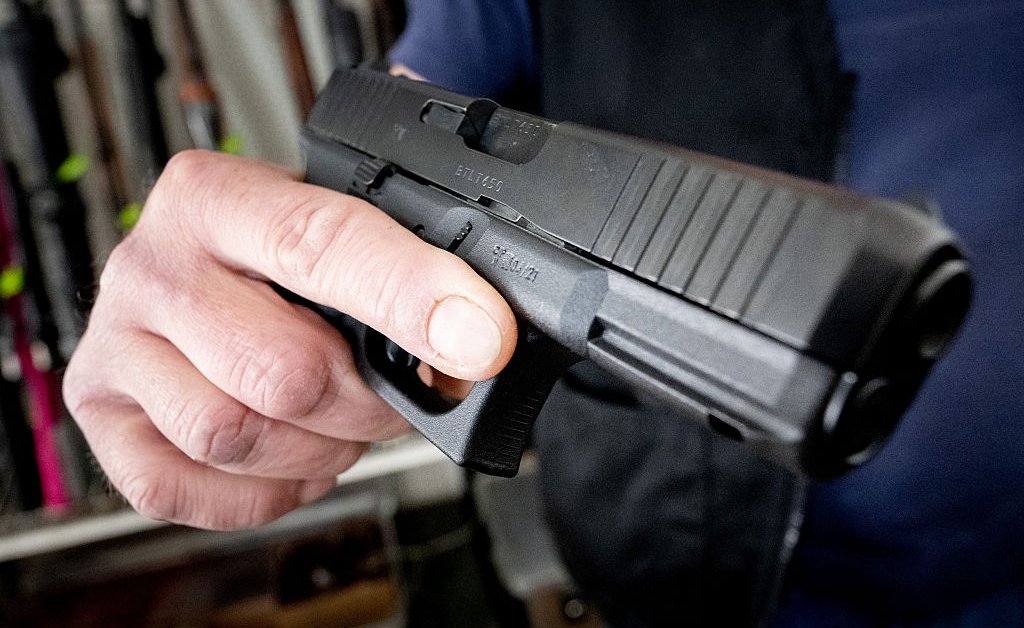The Second Amendment will soon take center stage in the Supreme Court again, as the justices are set to weigh marijuana users’ right to bear arms.
President Donald Trump has positioned himself as a vocal defender of the amendment, at one point referring to himself as the “most pro-gun, pro-Second Amendment president you’ve ever had in the White House.” But in United States v. Hemani, which the Supreme Court will hear arguments over some time early next year following a request from the Trump Administration, his Justice Department will argue in favor of restrictions on gun ownership.
The case was brought by a Texas man who was prosecuted for violating a federal statute that bars people who use illegal drugs from gun possession. Attorneys representing the man argued that the ban was unconstitutional in its application. Both a district judge and the 5th Circuit Court of Appeals ruled in his favor.
The Department of Justice, in its June request for the Supreme Court to hear the case, called the right to bear arms a “fundamental right that is essential to ordered liberty” and acknowledged that restrictions on that right posed a threat to freedoms. But, the agency added, there are “narrow circumstances in which the government may justifiably burden that right.”
The case could affect millions of people. Each year more than 50 million American adults report using marijuana, the “most popular drug in America,” according to the National Center for Drug Abuse Statistics. And around a third of Americans say they personally own a gun, the Pew Research Center reports, though it’s unclear how much overlap there is between the two groups.
Here’s what to know.
What is the case about?
Ali Danial Hemani, a Texas man, was found to be in possession of a Glock 9 mm pistol, around 60 grams of marijuana, and 4.7 grams of cocaine after FBI agents searched his home in 2022. Federal prosecutors then charged Hemani with violating a federal law that prohibits firearm possession by individuals who are “unlawful user[s] of or addicted to any controlled substances.”
The federal statute is enforceable even in the nearly 40 states that allow for medical marijuana use, and 24 that allow for its recreational use, says Eric Ruben, professor at SMU Dedman School of Law and a fellow at the Brennan Center for Justice. That’s because even if states move to legalize a drug, if it is designated as illegal under the federal Controlled Substances Act, it is still illegal on the federal level. Marijuana is currently classified as a Schedule I drug—or a drug considered to pose a high risk of abuse and addiction that has no approved medical use
Hemani’s attorneys moved to dismiss the charges against him, arguing that the blanket ban on guns for drug users violated his Second Amendment rights. U.S. District Judge Amos Mazzant granted the motion, pointing to the Fifth Circuit’s 2023 decision in United States v. Daniels, which vacated a conviction under the same federal law because the court found the accused person was not actively or recently using illegal drugs.
When the federal government appealed the district court’s ruling, the Fifth Circuit upheld the decision, citing the Supreme Court’s 2022 ruling in New York State Rifle & Pistol Association, Inc. v. Bruen, in which the justices determined that the state of New York’s requirement for gun owners to show a specific need in order to be granted an unrestricted license to carry was unlawful. That case established a new Second Amendment test, holding that modern-day regulations regarding gun rights must have an analogous historical regulation. It allowed, however, for the “temporary disarmament” of people who could potentially misuse a firearm.
What the Supreme Court is considering
At issue before the Supreme Court is whether the federal statute barring gun ownership for unlawful drug users is similar enough to other historical restrictions on firearm possession.
The Department of Justice, in its request for the Supreme Court to hear the case, argued that the federal statute complies with the Second Amendment because it “targets a category of persons who pose a clear danger of misusing firearms: habitual users of unlawful drugs.” The agency also contended that the law is analogous to historical laws that limited the rights of “drunkards,” or people with alcohol abuse problems.
E. Lee Francis, assistant professor of law at Widener Law Commonwealth, says that the Supreme Court’s decision will depend on the time period the analogous law has to come from. “If we’re looking at that Reconstruction period of time, it might be easier for the government to justify their regulations, because there are laws that would have banned people who are actively intoxicated with alcohol from obtaining a firearm,” he says. “If it’s the founding era, the argument will be as the Fifth Circuit indicates—that there weren’t any laws that permanently disarmed individuals outside of felonies and the punishment there was death.”
The federal government has also argued that the federal statute complies with the Second Amendment because it poses a “limited, inherently temporary restriction—one which the individual can remove at any time simply by ceasing his unlawful drug use,” noting it only targets “habitual users” of illegal drugs.
But Francis says the case is much more complicated than that. While the Justice Department argues that drug users would not be subject to the law once they stop using the substances, he says, “the problem becomes, well, how do we know how much time has to pass before someone is no longer considered an unlawful user? Who controls that? Is it the individual?”
Additionally, Francis notes that drug users who may have been convicted under this specific federal statute will still be barred from possessing a firearm because of laws barring convicted felons from gun ownership. “That’s significant because it basically says, not only can we define ‘unlawful user’ however we want, and that could last as long as we decide, you still don’t just get your rights back because you’re still subject to a different statute as a convicted felon,” he says.
How will the Court rule?
It’s unclear how the Supreme Court will rule in the case, according to experts.
Ruben points to a split among federal courts over the historical analogue test. In the rulings thus far in Hemani, lower courts have found the federal statute unconstitutional in this particular case, in which the defendant was not actively intoxicated but does habitually use marijuana. But various courts have made different determinations in other cases, Ruben notes, pointing to United States v. Yancy, a 2010 case that also concerned a marijuana user in which a federal court upheld the federal statute as lawful.
“This case is going to present an opportunity to expound on how loose an analogy can be in order to shore up the constitutionality of the modern law,” says Ruben.
A recent decision from the nation’s highest court may provide some insight into how the justices might rule. Last year, the Supreme Court upheld a law banning individuals with domestic violence restraining orders from owning guns. “Interestingly, one of the things that they relied on, or that they emphasized, was the fact that it was a temporary restriction, that he was only restricted from gun possession during the pendency of the restraining order,” says Ruben. “In that regard, I think that temporal limitation is going to feature in this case as well, in ways in favor of upholding the law.”
Oral arguments in the Hemani case will be heard some time in early 2026, though exact dates have not yet been announced. A decision will follow in the summer.
The post Can Marijuana Smokers Legally Own Guns in the U.S.? What to Know as Supreme Court Set to Deliberate appeared first on TIME.




